|
| NEWS |
 |
| Perspectives on the arms control agenda in 2021 |
| On 14 April, SIPRI convened a virtual discussion to explore the current state of nuclear arms control and disarmament efforts. The panellists, HE Izumi Nakamitsu, United Nations Under-Secretary-General and High Representative for Disarmament Affairs; Major General (Retd) Yao Yunzhu, Academic Committee Member, Center for International Security and Strategy, Tsinghua University; and Dr Andrey Kortunov, Director General, Russian International Affairs Council, discussed both Russian and Chinese perspectives on arms control. The event is available to watch on SIPRI’s YouTube channel. |
|
|
Read more | Watch the conversation
|
|
|
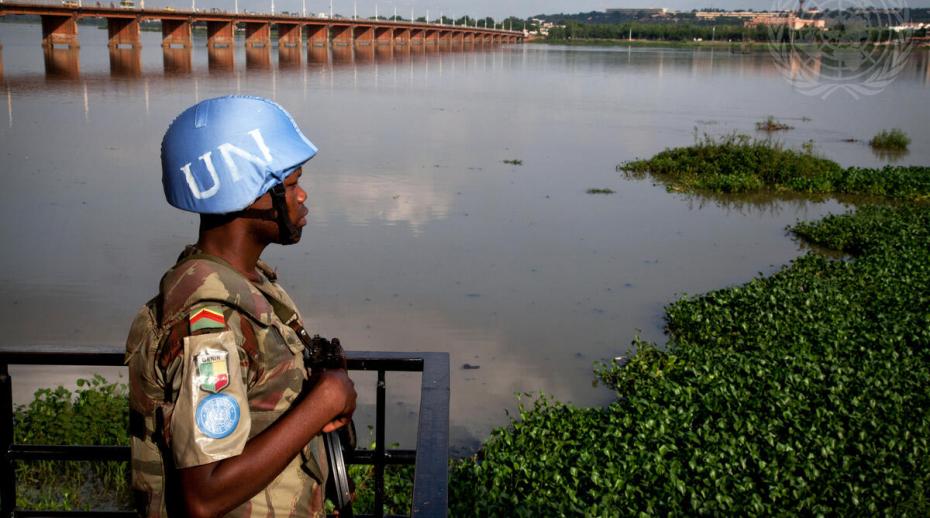 |
| New SIPRI Policy Paper: Climate-related Security Risks and Peacebuilding in Mali |
|
What does accelerating climate change mean for the future of peacebuilding? This month SIPRI published the Policy Paper ‘Climate-related Security Risks and Peacebuilding in Mali’, which sheds new light on this urgent question, through a case study of one of the biggest peace missions active today, the UN Multidimensional Integrated Stabilization Mission in Mali (MINUSMA). The Policy Paper concludes with a series of limitations and recommendations going forward.
|
|
|
Read more | Read the SIPRI Policy Paper
|
|
|
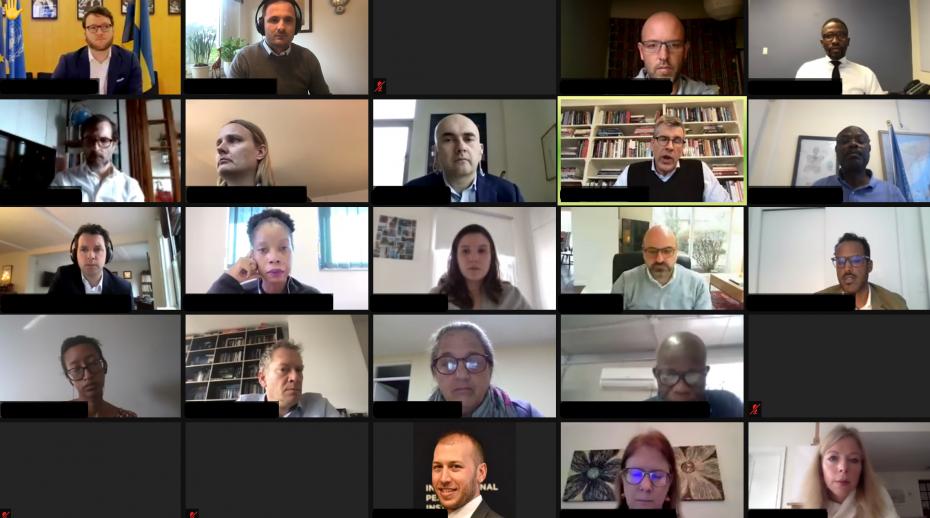 |
| SIPRI, IPI and NUPI co-host webinar on climate-related security risks |
|
On 26 March, SIPRI, the International Peace Institute (IPI) and the Norwegian Institute of International Affairs (NUPI) hosted a virtual expert-level dialogue on the theme ‘Translating Mandates into Policy Practice: Emerging Lessons from Operationalizing Climate-related Security Risks in Peace Operations and Peacebuilding’. The dialogue was organized against the backdrop that the UN Security Council increasingly tasks both UN peacekeeping operations and special political missions to consider and respond to climate-related security risks. In May, SIPRI will host a deep dive session at the 2021 Stockholm Forum on Peace and Development on how peace efforts in Mali and Somalia have taken climate-related security risks into account.
|
|
|
Read more
|
|
|
 |
| 2021 Stockholm Forum on Peace and Development: Open for registration |
|
SIPRI is pleased to open registration for the 2021 Stockholm Forum on Peace and Development, convened online during 4–7 May 2021. Under the theme ‘Promoting Peace in the Age of Compound Risk’, the 2021 Stockholm Forum will explore novel approaches and solutions to promoting peace in the age of interconnected risks reinforced by the Covid-19 pandemic. Join the Keynote Address by Hajer Sharief, co-founder of the Libyan non-governmental organization, Together We Build It, as well as cutting-edge online sessions on topics ranging from climate change to the women, peace and security agenda.
|
|
|
Read more | Register
|
|
|
|
| COMMENTARY |
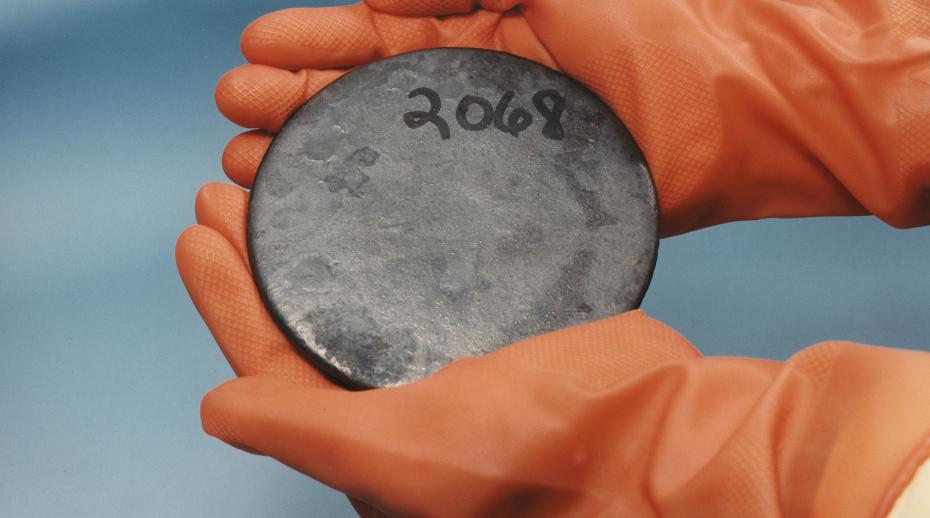 |
| How much of a proliferation threat is Iran’s uranium enrichment? |
|
Iran’s atomic energy agency announced recently that it had produced 55 kilograms of 20 per cent-enriched uranium in barely four months. This is a clear and deliberate step away from compliance with the terms of the troubled 2015 Joint Comprehensive Plan of Action (JCPOA). The JCPOA is intended to prevent Iran from developing a nuclear weapons programme. In this SIPRI Essay, Robert E. Kelley argues that, while any breach of the deal’s terms is a cause for concern, Iran’s production of 20 per cent-enriched uranium does not necessarily bring it closer to producing a nuclear weapon. In fact, it diverts resources away from any weapons programme.
|
|
Read the SIPRI Essay
|
|
|
|
|
 |
| Emergency law responses and conflict-affected states in transition |
|
Some type of emergency law response to Covid-19 has been used in most states. However, conflict ‘fault lines’ can mean that the ways in which countries use the law have the potential to undermine transitions from conflict to peace and authoritarianism to democracy. This SIPRI WritePeace Blog—the first in a series of blog posts from partners of the 2021 Stockholm Forum on Peace and Development—identifies several key areas where these emergency law responses weaken democratic transitions.
|
|
Read the SIPRI WritePeace Blog
|
|
|
|
|
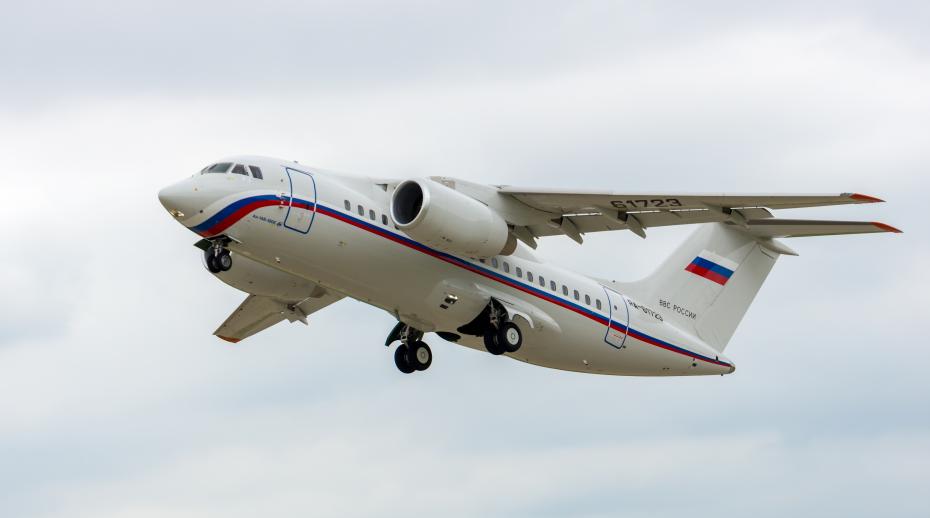 |
| Monitoring international arms transfers: The difficult case of production under licence |
|
The SIPRI Arms Transfers Database is a record of how certain military technological capabilities are transferred from state to state. But monitoring these transfers can be challenging. As a result, headline summary figures can throw up some initially surprising results. The release on 15 March of SIPRI’s new data on international transfers of major arms was no exception. This time, questions revolved around a transfer that—at first glance—appeared to violate a national arms export ban. In this SIPRI WritePeace Blog, Siemon T. Wezeman explains exactly what constitutes an ‘international transfer’ for the purpose of the SIPRI data and clarifies aspects of the methodology behind the recent data launch, with reference to Russia and Ukraine.
|
|
Read the SIPRI WritePeace Blog
|
|
|
|
| UPCOMING EVENTS |
| |
| 23 April 2021 |
| Peace, development and humanitarian action: Getting to a common understanding |
|
SIPRI and the UN Development Programme will co-organize a virtual panel on 23 April to discuss how humanitarian, development and peacebuilding action can become more coherent and coordinated in the emerging post-pandemic world. This event will bring together high-level panellists from development, humanitarian and peacebuilding communities to reflect on past and ongoing efforts at data exchange and joint analysis, examining what works and what must change.
|
|
Read more | Register
|
|
| |
| 27 April 2021, 15:30–16:30 |
| Taking Stock of the Arms Trade Treaty’s Implementation Assistance |
|
On 27 April, SIPRI is hosting a virtual side event on the role of international assistance to implement the Arms Trade Treaty (ATT). The event will be held in the framework of the ATT Working Group meetings and the Seventh Conference of States Parties Informal Preparatory Meeting (26–30 April 2021). It will stimulate a discussion on the main challenges and lessons learned by donors, partner countries and implementing agencies involved in international assistance programmes to support the implementation of the ATT six years after its entry into force.
|
|
Read more | Register
|
|
| |
| 4–7 May 2021 |
| 2021 Stockholm Forum on Peace and Development |
|
On 4–7 May, the 2021 Stockholm Forum on Peace and Development will be held under the theme ‘Promoting Peace in the Age of Compound Risk’.
|
|
Read more | Register
|
|
|
|
| |
| 24 May 2021, 18:00–19:15 |
| 2021 SIPRI Lecture by HE Madeleine Albright |
|
SIPRI is pleased to announce that the third annual SIPRI Lecture will honour HE Madeleine Albright, former US secretary of state. The lecture will be held virtually on 24 May 2021 on the theme ‘Democracy in a Post-Covid World’.
|
|
Read more
|
|
|
|
| STAFF NEWS AND VACANCIES |
|
|
|
| PUBLICATIONS |
 |
| Climate-related Security Risks and Peacebuilding in Mali |
| Climate-related security risks are changing the security landscape in which multilateral peacebuilding efforts are taking place. Following a similar assessment of the UN Assistance Mission in Somalia in 2019, this SIPRI Policy Paper offers another glimpse into the future of peacebuilding in the context of climate change, this time by providing an in-depth assessment of MINUSMA. |
|
Read the SIPRI Policy Paper
|
|
|
 |
| South Asia’s Nuclear Challenges: Interlocking Views from India, Pakistan, China, Russia and the United States |
| This SIPRI report provides an overview of views on nuclear postures and escalation affecting South Asia, based on 119 research interviews conducted with military, nuclear, political and regional experts from India, Pakistan, China, Russia and the USA. The publication also builds on the findings from a virtual workshop that SIPRI hosted in December 2020. These discussions revealed various interlocking insights on such issues as no first use, lowered nuclear thresholds, conventional and nuclear entanglement and emerging technologies that are shaping strategic stability. The publication concludes by offering building blocks for the next steps on engagement. |
|
Read the report
|
|
|
 |
| A Strategic Triangle in the Arctic? Implications of China–Russia–United States Power Dynamics for Regional Security |
| This SIPRI Insights on Peace and Security paper examines security challenges arising from the activities of three actors with a substantial ‘Arctic footprint’—China, Russia and the USA—and how they might be addressed in existing and new frameworks. Issues that occupy a ‘grey zone’ between military and non-military security will have to be addressed as digital and transport infrastructure expand in the Arctic. However, there is little experience in how diverse state and non-state actors can manage cooperation and competition simultaneously. |
|
Read the SIPRI Insights on Peace and Security
|
|
|
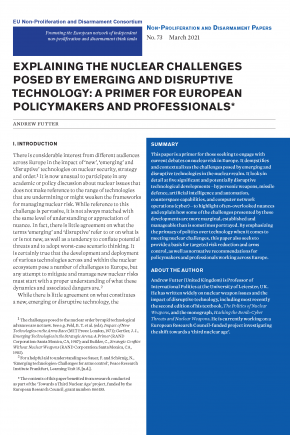 |
| Explaining the Nuclear Challenges Posed by Emerging and Disruptive Technology: A Primer for European Policymakers and Professionals |
| This paper is a primer for those seeking to engage with current debates on nuclear risk in Europe. It demystifies and contextualizes the challenges posed by emerging and disruptive technologies in the nuclear realm. By emphasizing the primacy of politics over technology when it comes to meeting nuclear challenges, this paper also seeks to provide a basis for targeted risk reduction and arms control, as well as normative recommendations for policymakers and professionals working across Europe. |
|
Read the EU Non-Proliferation and Disarmament Paper
|
|
|
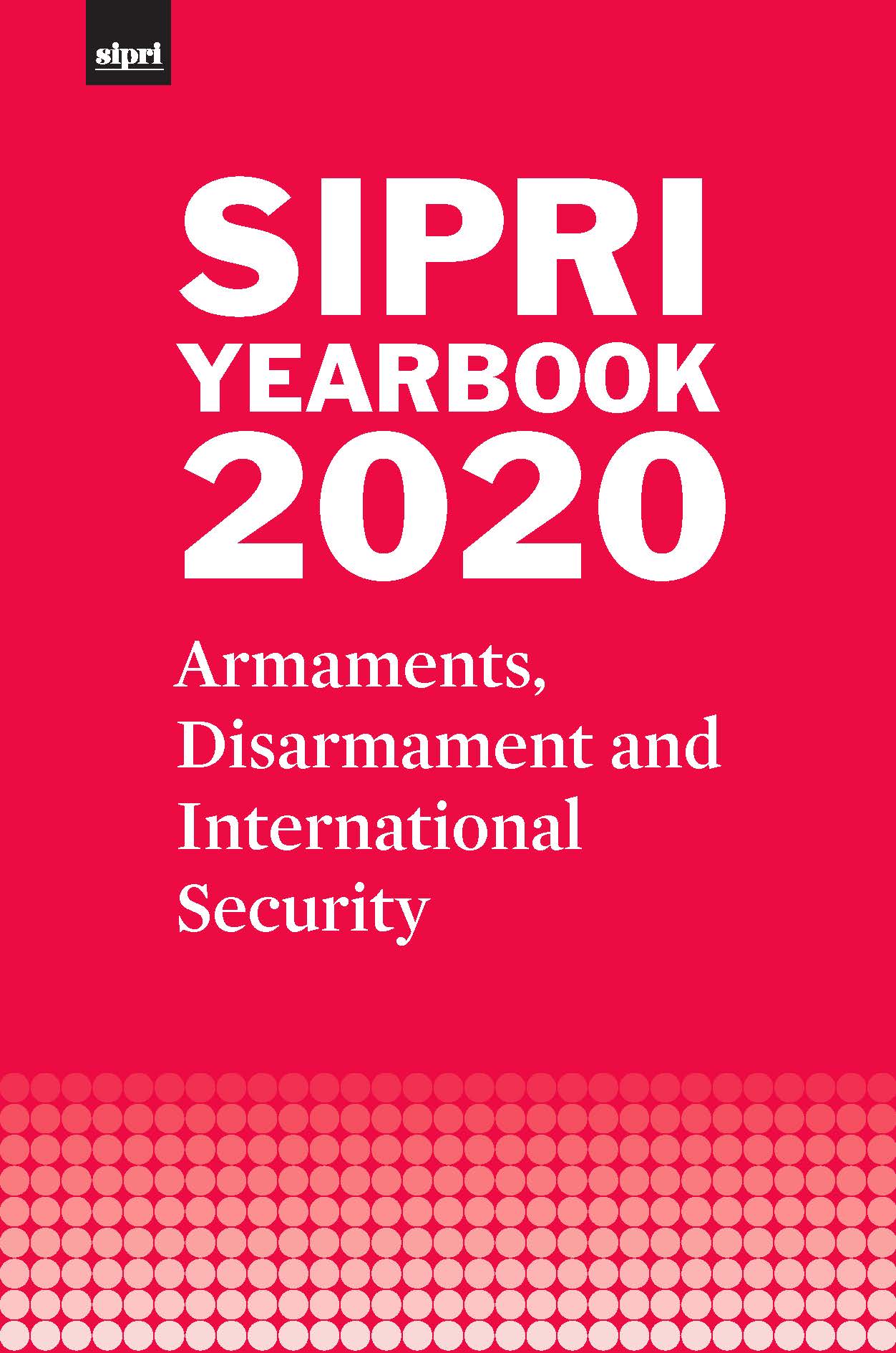 |
| SIPRI Yearbook 2020 |
SIPRI Yearbook 2020 presents a combination of original data in areas such as world military expenditure, international arms transfers, arms production, nuclear forces, armed conflicts and multilateral peace operations with state-of-the-art analysis of important aspects of arms control, peace and international security. It covers developments during 2019, including:
- the state of nuclear arms control;
- transparency in military spending;
- regional overviews of armed conflicts; and
- the investigation of allegations of chemical weapon use in Syria.
|
|
Browse the contents page | Download the summary (PDF) |
Order SIPRI Yearbook 2020
|
|
|
| |